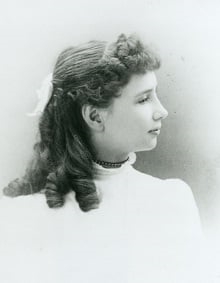 |
| Helen Keller (http://www.perkins.org/about/history/helen-keller-facts) |
Helen Keller was a remarkable woman who overcame an illness that took away the ability to see and hear things. Because of this, Helen was also mute, or not being able to speak. But, even with these circumstances, Helen still learned to communicate via sign language and writing. It was remarkable for the 1800s and 1900s because most people who had these disabilities were never taught and never thought to possess much intelligence.
When Helen was born, she could hear and see like a normal child; but when she was 19 months old, she contracted an illness (possibly scarlet fever or meningitis) that left her with no ability to see, hear, or speak. Her mother could not bear to send her child to an institution, so Keller was allowed to stay at home. As Keller grew older, her behavior became far more disruptive, like pranking people by locking them in rooms. Her parents were distressed and did not know what to do. Her mother and father then heard about a teacher, Anne Sullivan, from Alexander Graham Bell, who was working with deaf children. Keller's parents soon hired Anne to work with Helen. Anne worked hard with Helen to help her communicate with other people and to learn what children without disabilities would learn in school. Helen learned Braille and finger spelling before moving to college and earning her bachelor of arts degree from Radcliffe College in 1904.
After she graduated from college, Helen set out to learn more about the world after college and how to improve it. She became an advocate for people with disabilities, including blindness. She started lecturing about her experiences about being deaf, blind, and mute. She met several other activists, like George Kessler, and with him she co-founded Helen Keller International, a foundation to help identify the causes of blindness. In 1920, she helped found the ACLU, or American Civil Liberties Union. In 1924, she joined the American Federation for the Blind and participated in many campaigns to raise money and awareness for the blind.
To raise awareness for the blind, Helen wrote many books about her life, her thoughts, and her experiences. Her most famous book is The Story of My Life, where she recounts her life up to age 21. In 1957, the book was adapted into a television drama, The Miracle Worker, and was turned into a play 1959. Because of this drama, many people might not have discovered Helen Keller and the things she did.
Helen's health declined after a series of strokes in 1961. Although her activity decreased, she still received a vast amount of awards in recognition of her tireless efforts. Keller died in her sleep on June 1st, 1968. But her legacy still lives on. She was a heroic figure because she was instrumental in helping change the public perception of people's feelings toward those with disabilities. She helped people with disabilities find ways to overcome their obstacles and to be productive members of society.
Page created on 4/15/2015 12:00:00 AM
Last edited 4/15/2015 12:00:00 AM
